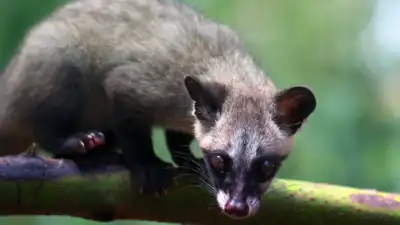ARTICLE AD BOX

In a wedding that has made headlines worldwide, a young Vietnamese bride in the country's An Giang province was given one of the strangest dowries on record: 100 female civet cats, in addition to gold, property, cash, shares of a company, and designer goods.
The lavish gift has touched off controversy over money, custom, and the morality of including live animals in dowries.The 22-year-old bride who graduated in business was said to have been given the civet cats by her father as a way of ensuring long-term financial independence. The civet cats, whose main contribution is to help produce kopi luwak, considered one of the most costly coffee brands globally, are considered to be valuable assets.
The price of each animal was put at more than $700, with pregnant civets worth much higher sums, according to news reports in local media.Aside from the 100 civets valued at a whopping $70,000 (approx.), the bride was also given 25 taels of gold, $7,600 cash, huge shares in a business, and seven pieces of property. The family of the groom, though modest in their gift, gave 10 bars of gold, cash of several thousand dollars, and a set of diamond jewelry.
A video from the ceremony, which went viral on social media, showed dozens of cages with civet cats lined up behind the couple’s table during the wedding festivities. This striking image—live animals being used as part of matrimonial gifting—has since sparked strong public reaction.
Ethical concerns and animal welfare

While other internet users saw the dowry as a status symbol and economic empowerment, others were seriously concerned about animal welfare.
Civets are nocturnal and solitary animals, and opponents argue that keeping them in large groups for breeding or coffee production may result in stress and bad living conditions. Animal welfare organizations had already raised an alarm about kopi luwak farming, particularly where civets are kept in cages and force-fed with coffee cherries for prolonged periods.Veterinarians and conservationists in the area have noted that although civet farming is not prohibited in Vietnam, the practice tends to hover at the edge of welfare standards and falls short of adequate regulatory control.
Cultural context
Dowries continue to be widespread throughout much of Southeast Asia, although their structure and content are shifting. This specific dowry appears to be a reflection of the modern spin—property not only for status but also to make money. Accounts indicate that the bride can choose to sell or breed the civets, so the offering is symbolic as well as practical.Nevertheless, the incident has initiated a national debate about whether age-old traditions need to be altered to accommodate new values regarding animal morality, eco-friendliness, and legality.This wedding has transcended mere marriage celebration—it has prompted reconsideration of where wealth, tradition, and responsibility meet in contemporary Vietnamese society. As photos and videos of the civet dowry continue to make the rounds, they put into sharp relief larger themes of animal commodification and the evolving character of ceremonial practices in Southeast Asia.Though the bride might now possess assets amounting to tens of thousands of dollars, the question is, at what expense?



.png)
.png)
.png)
















 12 hours ago
5
12 hours ago
5









 English (US) ·
English (US) ·